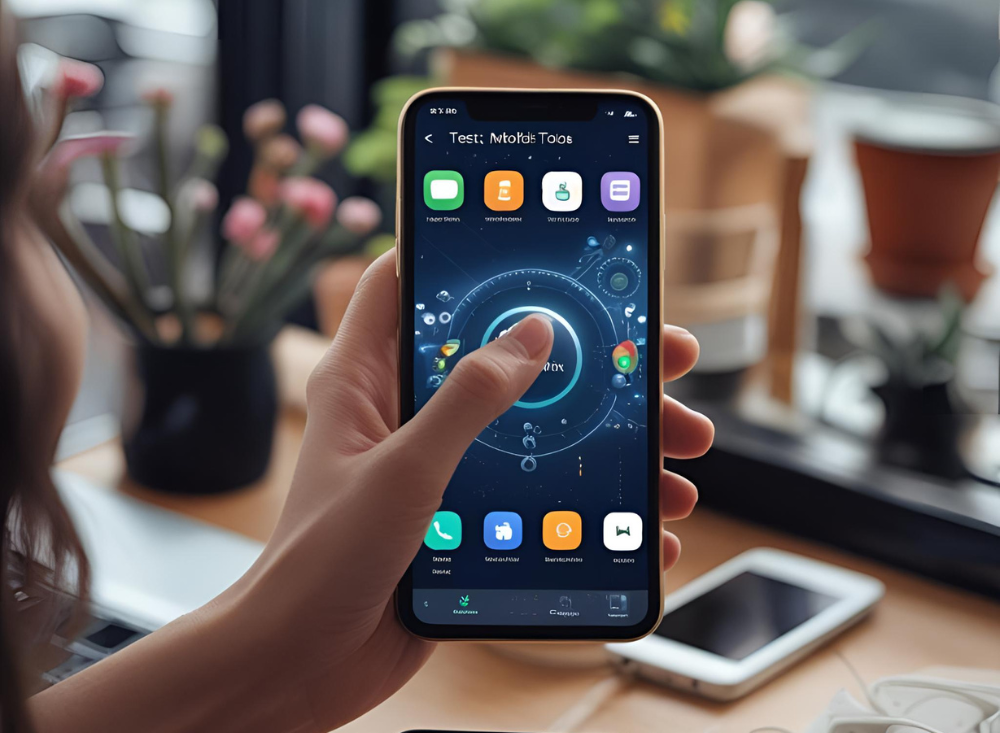
Mobile app quality has become the defining factor for user retention and brand reputation. With increasing device fragmentation, OS versions, and rapid release cycles, mobile app testing is no longer optional — it’s critical. Automating mobile tests helps reduce release times, improve coverage, and enhance confidence. In this article, we explore the top 10 mobile testing tools, the types of tests to automate, essential tips for quality mobile testing, and more.
Fast & Reliable: Genqe.ai
Genqe.ai is redefining mobile test automation with its generative AI-powered approach. It allows testers and developers to:
- Write tests in plain English
- Execute tests across mobile platforms seamlessly
- Auto-heal flaky tests
- Validate UI/UX behavior and backend integrations
- Use AI agents to adapt to new releases automatically
Why Genqe.ai Stands Out:
- No-code/low-code testing
- Cross-platform support (Android, iOS)
- Smart element detection using AI
- Self-healing capabilities reduce test maintenance
- Real-time analytics and alerts
It’s ideal for teams looking for speed, simplicity, and scalability in mobile testing.
Other Popular Mobile Testing Tools
Here are 9 more powerful mobile testing tools used across industries:
1. Appium
An open-source, cross-platform tool for automating native, hybrid, and mobile web apps.
- Language-agnostic: Java, Python, JS, etc.
- Integrates well with CI/CD tools
- Active developer community
2. Espresso
A native Android UI testing framework developed by Google.
- Great for white-box testing
- Runs fast with minimal flakiness
- Deep integration with Android Studio
3. XCUITest
Apple’s official UI testing tool for iOS apps.
- Fully integrated with Xcode
- Ideal for swift, secure iOS automation
- Native support from Apple
4. Detox
Gray box testing framework for React Native apps.
- Synchronizes UI and test execution
- Best for end-to-end testing of RN apps
- Strong support for CI environments
5. TestComplete
A commercial tool from SmartBear for automated UI testing.
- Supports Android and iOS
- Record-and-replay with scripting in VBScript, Python, JavaScript
- Visual object recognition
6. Katalon Studio
An all-in-one test automation platform with mobile capabilities.
- Record and script mobile test cases
- Built-in CI/CD support
- Ideal for QA teams without deep coding expertise
7. Ranorex Studio
Great for cross-platform test automation and GUI testing.
- Drag-and-drop UI test creation
- Works with real devices and emulators
- Strong reporting features
8. Robot Framework
Python-based generic automation framework with mobile support via Appium.
- Highly extensible via libraries
- Good for teams that want a unified testing framework
- Ideal for test-driven development
9. LambdaTest
A cloud-based testing platform for manual and automated app testing.
- Provides a wide range of real devices
- Integrates with Appium, Espresso, and more
- Good for remote/distributed testing teams
Types of Mobile Tests to Automate
Here are the essential types of tests worth automating in mobile QA:
- Smoke Tests
To verify basic functionality (e.g., app launch, navigation). - UI Tests
Validate layout, responsiveness, and user interaction flows. - Regression Tests
Ensure new code doesn’t break existing features. - Functional Tests
Check individual features like login, search, checkout, etc. - API Tests
Validate backend data handling and integrations. - Cross-Device Tests
Automate across different OS versions, screen sizes, and models. - Performance Tests
Load testing, battery consumption, and resource usage under stress.
Tips to Ensure High-Quality Mobile Testing
Testing mobile apps goes beyond running scripts. Here are some key strategies:
- Test on Real Devices
Emulators are good, but real devices provide true performance and user experience metrics. - Use Device Clouds
Platforms like Genqe.ai and LambdaTest give access to numerous devices remotely, reducing the need for physical labs. - Focus on Network Conditions
Test under varying network conditions (3G, 4G, Wi-Fi) and simulate disruptions. - Automate Smartly
Don’t automate everything. Focus on repeatable, stable flows and high-value scenarios. - Maintain Test Data Hygiene
Use fresh, consistent, and meaningful data in every test run. - Continuously Monitor Performance
Look beyond correctness — track load times, memory usage, crashes. - Leverage CI/CD
Integrate your test automation into the CI/CD pipeline for faster feedback loops. - Emphasize Accessibility
Test for screen readers, gesture support, and compliance with accessibility standards.
Conclusion
Mobile app testing requires more than just a few test cases — it demands a strategic, automated, and device-agnostic approach. With tools like Genqe.ai leading the way through AI-powered automation, testers can now build robust test coverage quickly and maintain it with minimal effort.
Whether you’re a startup releasing weekly updates or an enterprise managing complex mobile products, choosing the right mobile testing tool is the key to quality, speed, and user satisfaction.
Start with Genqe.ai if you’re aiming for speed and AI simplicity, and explore the rest based on your tech stack, app type, and team skills.
Would you like a comparison table or infographic summarizing these tools?